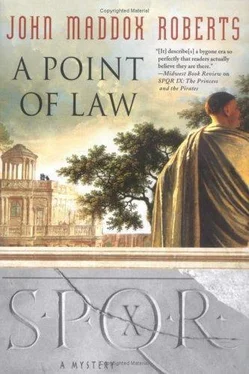John Roberts - A Point of Law
Здесь есть возможность читать онлайн «John Roberts - A Point of Law» весь текст электронной книги совершенно бесплатно (целиком полную версию без сокращений). В некоторых случаях можно слушать аудио, скачать через торрент в формате fb2 и присутствует краткое содержание. Год выпуска: 0101, ISBN: 0101, Издательство: St. Martin, Жанр: Исторический детектив, на английском языке. Описание произведения, (предисловие) а так же отзывы посетителей доступны на портале библиотеки ЛибКат.
- Название:A Point of Law
- Автор:
- Издательство:St. Martin
- Жанр:
- Год:0101
- ISBN:9780312337254
- Рейтинг книги:5 / 5. Голосов: 1
-
Избранное:Добавить в избранное
- Отзывы:
-
Ваша оценка:
- 100
- 1
- 2
- 3
- 4
- 5
A Point of Law: краткое содержание, описание и аннотация
Предлагаем к чтению аннотацию, описание, краткое содержание или предисловие (зависит от того, что написал сам автор книги «A Point of Law»). Если вы не нашли необходимую информацию о книге — напишите в комментариях, мы постараемся отыскать её.
A Point of Law — читать онлайн бесплатно полную книгу (весь текст) целиком
Ниже представлен текст книги, разбитый по страницам. Система сохранения места последней прочитанной страницы, позволяет с удобством читать онлайн бесплатно книгу «A Point of Law», без необходимости каждый раз заново искать на чём Вы остановились. Поставьте закладку, и сможете в любой момент перейти на страницу, на которой закончили чтение.
Интервал:
Закладка:
“Does anyone know anything about this man Fulvius?” Julia asked the table at large. It was a long table, and it held a fairly representative sampling of the neighborhood: shopkeepers, idlers, a thief, a Jewish marble merchant, a craftsman or two, even another senator.
This last was a man named Spurius Gavius Albinus, a man of a totally undistinguished Suburan family. Each generation they managed to get one son elected to a quaestorship and thence to a seat in the Senate. He then never held higher office, but membership in the Senate was for life, barring expulsion by the censors. Thus these Gavii retained their status as a senatorial family. The great majority of senators at the time were such men. Only a small group of senatorial families ever held the praetorship, and a smaller group yet, my own included, were consuls.
“Word has it,” a shopkeeper said, “that he was being lined up for next year’s tribuneship elections.”
“Where does this word originate?” Julia asked.
The man looked puzzled. “I don’t know. It’s just around. Fulvius was going to make a big name for himself by taking on the Metelli.”
“I heard,” said the thief, “that he had plans to make Pompey’s life miserable.”
“Pompey?” I said. “The wretch didn’t lack ambition.”
“Way I heard it,” the thief went on, “he figured he had better blood in him than Pompey.”
“I knew his father slightly,” said the marble merchant. “I travel to Baiae two or three times a year on business.” He was a fully Hellenized Jew, meaning that his dress, hair, beard, and adornments were all Greek, and he spoke that language with cultured fluency. He went by the name Philippus. I presume he chose the nane himself, and it was a clever one, being one of the few Roman names of Greek origin.
“He was Fulvius Flaccus, wasn’t he?” I inquired.
“Publius Fulvius Flaccus Bambalio,” Philippus said, giving it the full treatment. “He and his partner donated a fine Temple of Neptune to the city of Baiae. I furnished it inside and out with beautiful, sea green marble.”
“His partner being Sextus Manilius?” I asked.
“No. It was Caius Octavius, the one who was praetor some years ago.”
I almost knocked over my cup, but rescued it in time. “Octavius? I’d no idea the man had holdings in Baiae!”
“Oh, yes!” said Senator Gavius. “Octavius served as duumvir one year out of every three. He was one of the town’s main benefactors.” He added, with a smile of satisfaction, “I go to Baiae often.”
Probably because you never do anything for the state, I thought. I might have said something indiscreet, but Julia jumped in at that moment.
“We had heard that Fulvius Flaccus and Sextus Manilius are close friends.”
“They are,” Gavius said. “Manilius is another of the regular duumviri of Baiae. There’s a little group of families down there who take the highest offices in turn.” He refilled his cup and grinned at me. “Just like here.”
“Manilius?” said a copper founder named Glabrio. “Is he any relation to the young tribune?”
“Look!” Julia cried happily, stomping on my foot. “Here’s a hero we know back from the war!” It was fortuitous timing. Even without having my foot stomped on, I knew we didn’t want to expose this Gordian knot of intrigue before our neighbors.
Entering the courtyard was a family of my clients. In their lead was old Burrus, a veteran of my legion in Spain. Crowned with laurel, in military tunic and belt, was his son Lucius, whom I had last seen in Gaul a couple of years earlier. He had a hand on the shoulder of a nephew who wore one of the Gallic torques that were showing up everywhere. His mother was swathed in what appeared to be about ten yards of vividly checked and striped cloth.
“Patron! Domina!” Lucius said, catching sight of us. I took his hands and saw that he wore silver bracelets on both wrists. Among Roman men, only soldiers wear bracelets, and these are decorations for valor. It was rare for a man so young to wear two of them.
“I see you’ve been busy.” I poured a cup and handed it to him. “Still in the first cohort?”
“I’m an optio now, in the antesignani of the first cohort.”
Old Burrus beamed with pride, and he had reason to. The term is obsolete now, but in those days the antesignani , “those who fight before the standards,” were the cream of the legions, the bravest of the brave. To be an optio over such men was a great honor.
“Amazing! You’ll be a centurion in no time!”
“Next year,” he said confidently, “when the primus pilus retires, then my centurion becomes First Spear, and I step into his place.”
This popped my eyes. “That means you’ll be a senior centurion without ever having served in the junior centurionate!”
“Caesar knows how to reward the best men,” his father said, holding up one of the braceleted wrists for general admiration. “He’d be wearing the phalerae if he’d had the rank when he earned these.” These formidable decorations, nine massive silver disks worn on a harness, were awarded only to centurions. “As it is, he’ll be the youngest man ever to be senior centurion in the Tenth.”
“This we must hear about,” I said. We made room for them all at the table and spent the next hour or so hearing Lucius Burrus’s war stories. And to think that, just a few years before, I had saved this young hero from being executed for murdering his own centurion! It just goes to show that good deeds really are rewarded. Sometimes, anyway.
When the questioning eased up, Lucius turned to me and said, “Father tells me that you and your whole family are under attack.”
I gave him a brief rendition of events, the parts that had become public knowledge.
“Pompey’s probably behind it,” he stated flatly.
“Why do you say that?”
“He isn’t supporting us the way he was when the war started. He’s jealous of Caesar’s success and glory.”
“I don’t doubt that at all, but I don’t see him taking part in something like this. It’s too subtle. Pompey’s a man of direct action. Besides, how is this supposed to push us into Pompey’s camp?”
“I don’t know,” he admitted, “but it’s him. You’ll find out.” There was no shaking his assurance.
He was getting to be like Julia: Caesar could do no wrong, and Caesar’s rivals and enemies were not to be trusted. All of Caesar’s soldiers thought and spoke this way. I have never understood why men are so loyal to a man who is getting them killed for his own profit and glory, but they do. To be truthful, there is a great deal about human behavior that I fail to understand. Maybe philosophers know, but I am too old to take up philosophy now. Besides, I suspect that most philosophers are frauds and fools.
Later, Julia and I wandered over to the little Temple of Mercury that stood just behind our house.
“There’s another name that’s turned up too many times,” I said to her as we walked, “Octavius.”
“He was just a common political nonentity,” she said. “He made it as high as praetor, but he never achieved any real distinction. I think he died last year or the year before. But you’re right. A name that comes up twice when you are investigating a conspiracy has to be suspicious. Just this morning we were talking with Callista about his daughter and her marriage to Caius Marcellus-”
“That’s it!” I exclaimed, just as we turned the corner next to the little temple. Its altar fire still burned high, attended by a couple of sleepy-looking priests. They glanced our way at the sound of my cry.
“Keep your voice down. That’s what?”
“What Octavia said that was important and I couldn’t remember. She said she hadn’t seen her brother since he was an infant.”
Читать дальшеИнтервал:
Закладка:
Похожие книги на «A Point of Law»
Представляем Вашему вниманию похожие книги на «A Point of Law» списком для выбора. Мы отобрали схожую по названию и смыслу литературу в надежде предоставить читателям больше вариантов отыскать новые, интересные, ещё непрочитанные произведения.
Обсуждение, отзывы о книге «A Point of Law» и просто собственные мнения читателей. Оставьте ваши комментарии, напишите, что Вы думаете о произведении, его смысле или главных героях. Укажите что конкретно понравилось, а что нет, и почему Вы так считаете.









